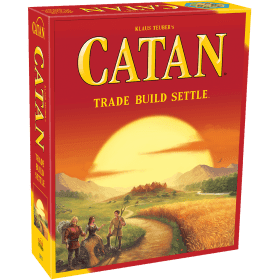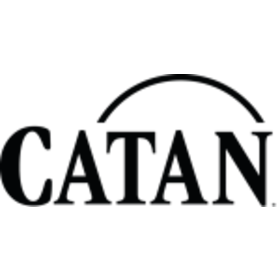CATAN The Settlers of Catan, Die Siedler von Catan, Les Colons de Catane
 First published in Germany in 1995 as Die Siedler von CATAN, then in English as The Settlers of CATAN in 1996, CATAN celebrates its 25th anniversary in 2020.
First published in Germany in 1995 as Die Siedler von CATAN, then in English as The Settlers of CATAN in 1996, CATAN celebrates its 25th anniversary in 2020.
To begin the game, you build the game board using hexagonal terrain tiles. Catan is born - a beautiful island with mountains, pastures, hills, fields, and forests, surrounded by the sea.
Each of you places two small houses on spaces where three terrain hexes meet. They are your starting settlements.
And so it begins. The starting player rolls two dice. An “11!” Each terrain hex is marked with a number. Each player who owns a settlement adjacent to a terrain hex marked with the number rolled receives a resource produced by this hex. Hills produce brick, forests produce lumber, mountains produce ore, fields produce grain, and pastures produce wool.
You use these resources to expand across Catan: you build roads and new settlements or upgrade your existing settlements to cities. For example, a road costs 1 brick and 1 lumber. If you do not have the necessary resources, you can acquire them by trading with your opponents.
Each settlement is worth 1 victory point and each city is worth 2 victory points. If you expand cleverly, you may be the first player to reach 10 victory points and thus win the game!
Number of players: 3 - 4
Game duration: 39 mn
Complexity: 2 / 5
Play CATAN and 988 other games online.
No download necessary - play directly from your web browser.
With your friends and thousands of players from the whole world.
Free.

Play CATAN and 988 other games online.
No download necessary - play directly from your web browser.
With your friends and thousands of players from the whole world.
Free.

Rules summary
Objective
Get resources to buy various buildings and development cards, and try to be the first player to reach 10 points.
Setup
- The board consists of hills (brick), forest (lumber), mountains (ore), fields (grain), pasture (wool) and a desert (nothing) at random places.
- Each terrain except the desert has a number of 2-12 on it. The desert starts with the robber on it.
- Each player places 2 settlements and 1 road next to each settlement on the board, then they receive resources for each terrain around the second settlement.
Gameplay
Rolling for resource production (obligatory): On your turn, roll 2 dice and calculate the sum.
- The terrains with that number produce resources for all players who have settlements or cities next to them (if the robber isn't blocking them): 1 resource per settlement and 2 per city.
- If you roll a 7, no one gets any resources and players with 8 resources or more must discard half of them (rounded down). You must move the robber to a new terrain and steal 1 random resource from a player who has a settlement or city next to that terrain.
Trading (optional): during your turn you can trade resources
- • with all other players (domestic trade)
- • with the bank (maritime trade) at the standard rate of 4 identical resources for 1 or at a preferential rate of a harbour if you have a settlement next to it.
Building (optional): finally, you can build roads and settlements, upgrade settlements to cities or purchase a development card by paying the resources needed.
- • roads must connect to the initial settlements and cost 1 brick + 1 lumber (worth 0 points)
- • settlements must be connected by roads to existing settlements (except at start) and cost 1 brick + 1 lumber + 1 wool + 1 grain (worth 1 point)
- • cities replace an existing settlement and cost 3 ore + 2 grain (worth 2 points)
- • development cards cost 1 ore + 1 wool + 1 grain and include
- • 14 knight cards that allow to move the robber to another terrain and steal a resource
- • 2 road building cards allowing extra roads to be built
- • 2 year of plenty cards providing two free resources of choice
- • 2 monopoly cards giving all other players that help gathering resources or building road•s
- • 5 victory point cards
You can play a development card at any time during your turn, even before rolling the dice, as long as it was bought on a previous turn and is not a victory card.
Scoring
- • Settlements: each is worth 1 victory point.
- • Cities: each is worth 2 victory points (1 Point from the settlement + 1).
- • Victory point cards: some development cards are worth 1 victory point. They are kept hidden until you have sufficent points to win.
- • Largest army: the player who has played the most knight cards at any time (at least 3) gets the largest army card which is worth 2 points.
- • Longest road: the player with the longest continuous road at any time (at least 5 segments) gets the longest road card which is worth 2 points.
If there is a tie, the original owner keeps the achievement cards.
End of game
If a player has 10 or more victory points during their turn (including victory points cards), they reveal them and the game ends with their victory. For Catan Cities & Knights, a player needs 13 or more victory points to win.


